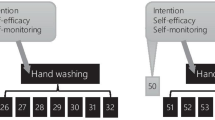Abstract
Manufacturers of household appliances and detergents have made great and successful strides in recent years to meet the challenge of sustainable development. But it is primarily the consumer who, through her/his individual use of household appliances, has an essential impact on the energy and resource consumption of a household, particularly in the area of textile care. Considerable savings potentials have been identified by a number of studies. But which methods are suitable for convincing consumers to practice more sustainable washing behavior? In addition to the frequently used informational brochures, some authors have suggested using alternative channels and forms of communication. One of the options is motivational interviewing, which has so far mostly been used in the medical area but seems to be suited also for other applications. This study applies motivational interviewing to the field of household technology and examines if interviews which are based on this technique can influence aspects of the washing behavior that are strongly related to sustainability. For this purpose, the participants’ washing behavior was recorded in a washing diary before and after the intervention, and sustainability was operationalized and compared using several evaluated aspects. The data gathered show that the sustainability of washing behavior in the group of subjects studied increased after an intervention by means of motivational interviewing. It also showed that the necessity to increase the sustainability of washing behavior is still an issue. Personalized communication designed specifically for the target group, such as in motivational interviewing, seems to be suitable for this purpose and might also be used in the future by actors advising consumers.












Similar content being viewed by others
Notes
“Charter for Sustainable Cleaning is a voluntary initiative of the European soaps, detergents, and maintenance products industry. The aim is to encourage the whole industry to undertake continual improvement in terms of sustainability and also to encourage consumers to adopt more sustainable ways of doing their washing, cleaning, and household maintenance” (International Association for Soaps, Detergents, and Maintenance Products 2012).
References
Berkholz, P.; Brückner, A.; Kruschwitz, A.; Stamminger, R. (2007). Verbraucherverhalten und verhaltensabhängige Einsparpotentiale beim Betrieb von Waschmaschinen. Aachen: Shaker (Schriftenreihe der Haushaltstechnik Bonn, 2007, 1).
Ciegis, R., Ramanauskiene, J., & Martinkus, B. (2009). The concept of sustainable development and its use for sustainability scenarios. Engineering Economics, 2, 28–37.
Frick, K. M., & Brueck, R. (2010). Kurzintervention mit Motivierender Gesprächsführung. Köln: Deutscher Ärzte-Verlag.
Gebhard, J.; Wolf, C.; Ochs, K. (2008). Richtig Waschen. http://www.henkel.de/de/content_data/99113_richtigwaschen.pdf. Accessed 10 October 2012
Goldsmith, E. B., & Goldsmith, E. G. (2011). Social influence and sustainability in households. International Journal of Consumer Studies, 35, 117–121.
Heinzel, M., Kyas, A., Weide, M., Breves, R., & Bockmühl, D. P. (2010). Evaluation of the virucidal performance of domestic laundry procedures. International Journal of Hygiene and Environmental Health, 213, 334–337.
International Association for Soaps, Detergents, and Maintenance Products (2008). Annual Review 2008. Towards sustainable cleaning: A.I.S.E. Highlights from 2008. http://www.aise.eu/downloads/AISE_AR2008FINAL.pdf. Accessed 27 October 2011.
International Association for Soaps, Detergents, and Maintenance Products (2012). What is the Charter? A European industry sustainability scheme, http://www.sustainable-cleaning.com/en.home.orb. Accessed: October 27, 2012.
Janczak, F., Stamminger, R., Nickel, D., & Speckmann, H.-D. (2010). Energy savings by low temperature washing. SÖFW-Journal, 136, 66–72.
Järvi, P., & Paloviita, A. (2007). Product-related information for sustainable use of laundry detergents in Finnish households. Journal of Cleaner Production, 15(7), 681–689.
Kollmuss, A., & Agyeman, J. (2002). Mind the gap: why do people act environmentally and what are the barriers to pro-environmental behavior? Environmental Education Research, 8, 239–260.
Kutsch, T.; Piorkowsky, M.-B., Schätzke, M. (1997). Einführung in die Haushaltswissenschaft. Haushaltsökonomie, Haushaltssoziologie, Haushaltstechnik. Stuttgart (Hohenheim): UTB; Ulmer (Uni-Taschenbücher Haushalts- und Ernährungswissenschaften, 1978).
Laitala, K., Boks, C., & Klepp, I. G. (2011). Potential for environmental improvements in laundering. International Journal of Consumer Studies, 35, 254–264.
Laitala, K., Klepp, I. G., & Boks, C. (2012). Changing laundry habits in Norway. International Journal of Consumer Studies, 36, 228–237.
Lichtenberg, W., Girmond, F., Nieder, R., & Schulze, I. (2006). Hygieneaspekte beim Niedrigtemperaturwaschen. SÖFW-Journal, 132, 28–34.
Miller, W. R., & Rollnick, S. (2002). Motivational interviewing. Preparing people for change (2nd ed.). New York: Guilford Press.
Miller, W. R., & Rollnick, S. (2004). Motivierende Gesprächsführung (2nd ed.). Freiburg, Breisgau: Lambertus.
Pakula, C.; Stamminger, R. (2010). Electricity and water consumption for laundry washing by washing machine worldwide. Energy Efficiency, 3(4), 365–382.
Reinhardt, S.D. (2008). Geschlechtsunterschiede in der Wirksamkeit von Kurzinterventionen bei Patienten mit alkoholbezogenen Störungen in Praxen niedergelassener Ärzte. http://www.students.informatik.uni-luebeck.de/zhb/ediss507.pdf. Accessed 10 October 2012
Rollnick, S.; Heather, N.; Bell, A. (1992). Negotiating behaviour change in medical settings: The development of brief motivational interviewing. Journal of Mental Health, (1992) 1, 25–37.
Rüdenauer, I.; Grießhammer, R. (2004). Produkt-Nachhaltigkeitsanalyse von Waschmaschinen und Waschprozessen. Published by Öko-Institut. http://www.prosa.org/fileadmin/user_upload/pdf/EcoTopTen_Endbericht_Waschen.pdf. Accessed 01 August 2011.
Rüdenauer, I.; Eberle, U.; Grießhammer, R. (2006). Ökobilanz und Lebenszykluskostenrechnung Wäschewaschen. Published by Öko-Institut. http://www.oeko.de/oekodoc/289/2006-008-de.pdf. Accessed 01 August 2011.
Stamminger, R. (2008). Nachhaltigkeit und Haushaltstechnik. Hauswirtschaft und Wissenschaft. Europäische Zeitschrift für Haushaltsökonomie, Haushaltstechnik und Sozialmanagement, 8, 70–75.
Stamminger, R. (2009). Synergy potential of smart domestic appliances in renewable energy systems. Aachen: Shaker (Schriftenreihe der Haushaltstechnik Bonn, 2009, 1).
Stamminger, R., & Goerdeler, G. (2007). Aktionstag Nachhaltiges Waschen—Was macht der Verbraucher? SÖFW-Journal, 3, 57–67.
Throne-Holst, H., Strandbakken, P., & Stø, E. (2008). Identification of households’ barriers to energy saving solutions. Management of Environmental Quality: An International Journal, 19, 54–66.
Wagner, G. (2010). Waschmittel. Chemie, Umwelt, Nachhaltigkeit. 4, vollständig überarbeitete und erweiterte Auflage. Weinheim: Wiley.
Acknowledgments
The authors would like to thank Miele & Cie. KG, Henkel AG & Co. KGaA, and Reckit Benckiser for supporting this research. We also would like to thank the anonymous reviewers for giving valuable comments.
Author information
Authors and Affiliations
Corresponding author
Rights and permissions
About this article
Cite this article
Conrady, T., Kruschwitz, A. & Stamminger, R. Influencing the sustainability of washing behavior by using motivational interviewing. Energy Efficiency 7, 163–178 (2014). https://doi.org/10.1007/s12053-013-9215-9
Received:
Accepted:
Published:
Issue Date:
DOI: https://doi.org/10.1007/s12053-013-9215-9




